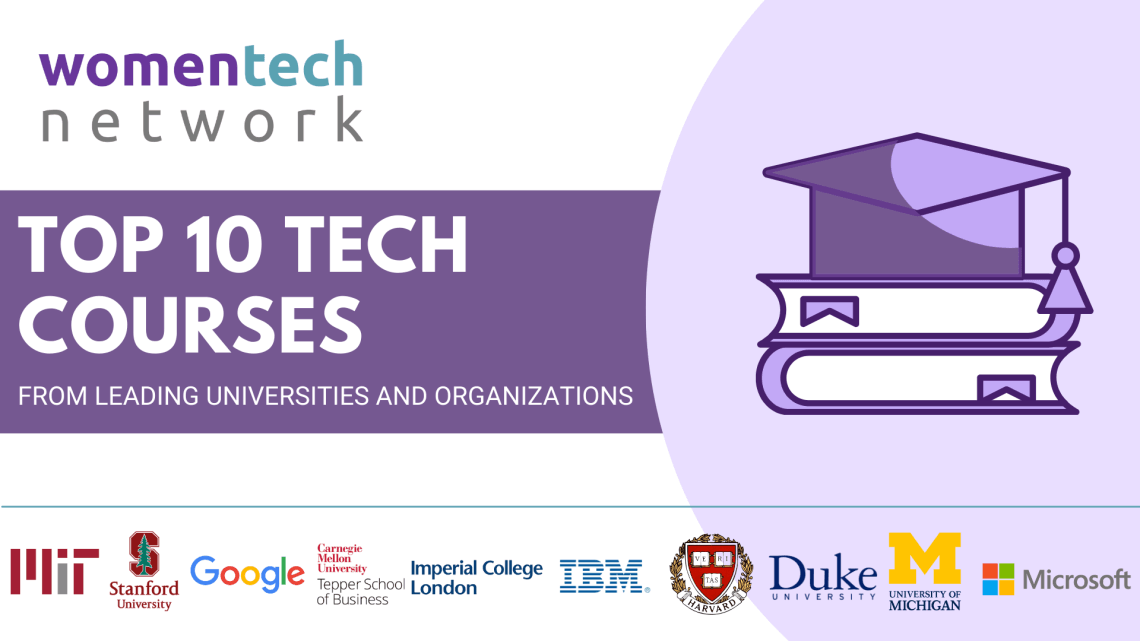
Are you eager to advance your tech skills with top-notch education? We’ve curated a list of the best tech courses offered by world-renowned institutions like MIT, Duke, Google, IBM, Stanford, and more. Whether you're interested in programming, data science, cybersecurity, or AI, these courses provide high-quality education from the best in the field. Continuous learning is vital in today's fast-paced tech industry, with studies showing that 94% of employees would stay longer at a company that invests in their learning and development, and companies with strong learning cultures seeing a 30%-50% higher engagement and retention rate according to Harvard Business Publishing and the Business Insider. Dive into these courses to start learning from the industry's top experts and take your career to new heights!
MITx: Machine Learning with Python: from Linear Models to Deep Learning by The Massachusetts Institute of Technology via edX
About the course: This course is an in-depth introduction to the field of machine learning, from linear models to deep learning and reinforcement learning, through hands-on Python projects. Machine learning methods are widely used across engineering and sciences, from computer systems to physics. Students will gain practical experience with algorithms to turn training data into effective automated predictions.
Modules: Linear classifiers, separability, perceptron algorithm; Maximum margin hyperplane, loss, regularization; Stochastic gradient descent, over-fitting, generalization; Linear regression; Recommender problems, collaborative filtering; Non-linear classification, kernels; Learning features, Neural networks; Deep learning, back propagation; Recurrent neural networks; Generalization, complexity, VC-dimension; Unsupervised learning: clustering; Generative models, mixtures; Mixtures and the EM algorithm; Learning to control: Reinforcement learning; Reinforcement learning continued; Applications: Natural Language Processing
Level: Advanced
Price: €277
Algorithms Specialization by Stanford University via Coursera
About the course: Algorithms are the heart of computer science, and the subject has countless practical applications as well as intellectual depth. This specialization is an introduction to algorithms for learners with at least a little programming experience. The specialization is rigorous but emphasizes the big picture and conceptual understanding over low-level implementation and mathematical details.
Modules: Divide and Conquer, Sorting and Searching, and Randomized Algorithms; Graph Search, Shortest Paths, and Data Structures; Greedy Algorithms, Minimum Spanning Trees, and Dynamic Programming; Shortest Paths Revisited, NP-Complete Problems and What To Do About Them
Level: Intermediate (Learners should know how to program in at least one programming language (like C, Java, or Python); some familiarity with proofs, including proofs by induction and by contradiction; and some discrete probability, like how to compute the probability that a poker hand is a full house. At Stanford, a version of this course is taken by sophomore, junior, and senior-level computer science majors.)
Price: 7 Day Free Trial on Coursera and €45 per month to continue learning after your trial ends
Cybersecurity Professional Certificate by Google via Coursera
About the course: This certificate program is designed to help you start a career in cybersecurity. You'll learn essential skills at your own pace, with no degree or prior experience required. The course covers the importance of cybersecurity practices, how to identify risks, threats, and vulnerabilities, and techniques to mitigate them. You'll also learn to protect networks, devices, people, and data using Security Information and Event Management (SIEM) tools, and gain hands-on experience with Python, Linux, and SQL.
Modules: Foundations of Cybersecurity; Play It Safe: Manage Security Risks; Connect and Protect: Networks and Network Security; Tools of the Trade: Linux and SQL; Assets, Threats, and Vulnerabilities; Sound the Alarm: Detection and Response; Automate Cybersecurity Tasks with Python; Put It to Work: Prepare for Cybersecurity Jobs
Level: Beginner
Price: 7 Day Free Trial on Coursera and €45 per month to continue learning after your trial ends
Master of Science in Product Management at Carnegie Mellon Tepper School of Business
About this program: The Master of Science in Product Management (MSPM) is designed to launch your career in product management in just one focused year. This program prepares you to tackle complex problems, whether you aspire to deliver innovative healthcare solutions, create efficient transportation systems, promote accessible education, or develop immersive entertainment experiences. The MSPM equips you with the skills to empathize with customers, lead cross-functional teams, and deliver business value, positioning you for a leading-edge career in dynamic, tech-driven industries.
Modules: Business Fundamentals for High Tech PM; Digital Service Innovation OR Service Design for Product Management OR Design of Artificial Intelligence Products; Principles of Product Management; Business Presentations for Product Managers; Managing People and Teams; Product Marketing; Data Science for Product Managers; HCI for Product Managers
Level: Master Program; Students typically come from a technical background in computer science or engineering; some also come from marketing, finance, and other disciplines.
Price: Tuition is charged at the rate of $35,328 per semester for spring and fall. Tuition is charged at a rate of $2,208 for summer, when students generally enroll for their three-unit internship course.
Mathematics for Machine Learning: PCA by Imperial College London via Coursera
About the course: This course covers the mathematical foundations of Principal Component Analysis (PCA), a key dimensionality reduction technique. You'll learn basic statistics, inner products for computing distances and angles, and how to derive orthogonal projections. By the end, you'll be able to implement PCA to minimize reconstruction error in data points. The course includes jupyter notebooks for practical exploration and requires abstract thinking, linear algebra, multivariate calculus, and basic Python with numpy.
Modules: Statistics of Datasets; Inner Products; Orthogonal Projections; Principal Component Analysis
Level: Intermediate
Price: 7 Day Free Trial on Coursera and €45 per month to continue learning after your trial ends
IBM Data Analyst Professional Certificate via Coursera
About the course: Prepare for a career as a data analyst with this comprehensive program from IBM. You'll build job-ready skills, including AI competencies, with no prior experience required. The course covers essential data visualization techniques using Excel, IBM Cognos Analytics, and Tableau. You'll also develop proficiency in Python for data analysis using libraries like Pandas and Numpy. Gain hands-on experience through labs and projects, and build a portfolio to showcase your skills. Earn a credential from IBM to boost your career prospects in this in-demand field.
Modules: Introduction to Data Analytics; Excel Basics for Data Analysis; Data Visualization and Dashboards with Excel and Cognos; Python for Data Science, AI & Development; Python Project for Data Science; Databases and SQL for Data Science with Python; Data Analysis with Python; Data Visualization with Python; IBM Data Analyst Capstone Project; Generative AI: Enhance your Data Analytics Career; Data Analyst Career Guide and Interview Preparation
Level: Beginner
Price: 7 Day Free Trial on Coursera and €45 per month to continue learning after your trial ends
HarvardX: Introduction to Data Science with Python via edX
About the course: This course focuses on using Python to analyze and make sense of large data sets collected by computers. It covers the basics of data science, machine learning models, and AI concepts. Learners will study regression and classification models using libraries like sklearn, Pandas, matplotlib, and numpy. Key topics include model complexity, overfitting prevention, regularization, and model evaluation. The course aims to build confidence in using Python for data analysis and prepare learners for advanced studies and career advancement in machine learning and AI.
Modules: Linear Regression; Multiple and Polynomial Regression; Model Selection and Cross-Validation; Bias, Variance, and Hyperparameters; Classification and Logistic Regression; Multi-logstic Regression and Missingness; Bootstrap, Confidence Intervals, and; Hypothesis Testing; Capstone Project
Level: Intermediate. Learners must have a minimum baseline of programming knowledge (preferably in Python) and statistics in order to be successful in this course. Python prerequisites can be met with an introductory Python course offered through CS50’s Introduction to Programming with Python, and statistics prerequisites can be met via Fat Chance or with Stat110 offered through HarvardX.
Price: Free with option to upgrade
Introduction to Machine Learning by Duke University via Coursera
About the course: This course will provide you a foundational understanding of machine learning models (logistic regression, multilayer perceptrons, convolutional neural networks, natural language processing, etc.) as well as demonstrate how these models can solve complex problems in a variety of industries, from medical diagnostics to image recognition to text prediction. In addition, we have designed practice exercises that will give you hands-on experience implementing these data science models on data sets. These practice exercises will teach you how to implement machine learning algorithms with PyTorch, open source libraries used by leading tech companies in the machine learning field.
Modules: Simple Introduction to Machine Learning; Basics of Model Learning; Image Analysis with Convolutional Neural Networks; Recurrent Neural Networks for Natural Language Processing; The Transformer Network for Natural Language Processing; Introduction to Reinforcement Learning
Level: Intermediate
Price: 7 Day Free Trial on Coursera and €45 per month to continue learning after your trial ends
Python Data Structures by The University of Michigan via Coursera
About the course: This course introduces the core data structures of the Python programming language, moving beyond basic procedural programming to explore how Python's built-in data structures—such as lists, dictionaries, and tuples—can be used for complex data analysis. You'll learn to create programs that read and write data from files, store data as key/value pairs using dictionaries, and perform multi-step tasks like sorting or looping with tuples. Through hands-on projects, you'll develop job-relevant skills and earn a shareable career certificate, guided by industry experts.
Modules: Installing and Using Python, Tuples, Dictionaries, Lists, Files, Strings
Level: Beginner
Price: 7 Day Free Trial on Coursera and €45 per month to continue learning after your trial ends
Microsoft Cybersecurity Analyst Professional Certificate via Coursera
About the course: Launch your career as a cybersecurity analyst with this comprehensive program. You'll build job-ready skills and essential AI competencies, earning a credential from Microsoft with no prior experience required. The course covers the cybersecurity landscape, core security concepts, and methods to protect network infrastructures and data. You'll learn to develop and implement threat mitigation strategies within an Azure environment. Demonstrate your new skills with a capstone project and prepare for the industry-recognized Microsoft SC-900 Certification exam.
Modules: Introduction to Computers and Operating Systems and Security; Introduction to Networking and Cloud Computing; Cybersecurity Threat Vectors and Mitigation; Cybersecurity Identity and Access Solutions using Azure AD; Cybersecurity Solutions and Microsoft Defender; Cybersecurity Tools and Technologies; Cybersecurity Management and Compliance; Advanced Cybersecurity Concepts and Capstone Project; Microsoft SC-900 Exam Preparation and Practice
Level: Beginner
Price: 7 Day Free Trial on Coursera and €45 per month to continue learning after your trial ends
Conclusion
In today's rapidly evolving tech landscape, continuous learning is more important than ever. The courses we've highlighted from leading universities and organizations like MIT, Duke, Google, IBM, Stanford, and more offer valuable opportunities to enhance your skills and advance your career in various tech fields, from programming and data science to cybersecurity and AI.
For those looking to broaden their horizons, the Women in Tech Global Conference 2025 offers a fantastic learning opportunity where women from top companies worldwide share their expertise. Engaging in these top-tier courses and attending the conference not only helps you stay ahead in your career but also positions you as a leader in the industry. Embrace these educational opportunities to drive your professional growth and make a significant impact in the tech world.
















